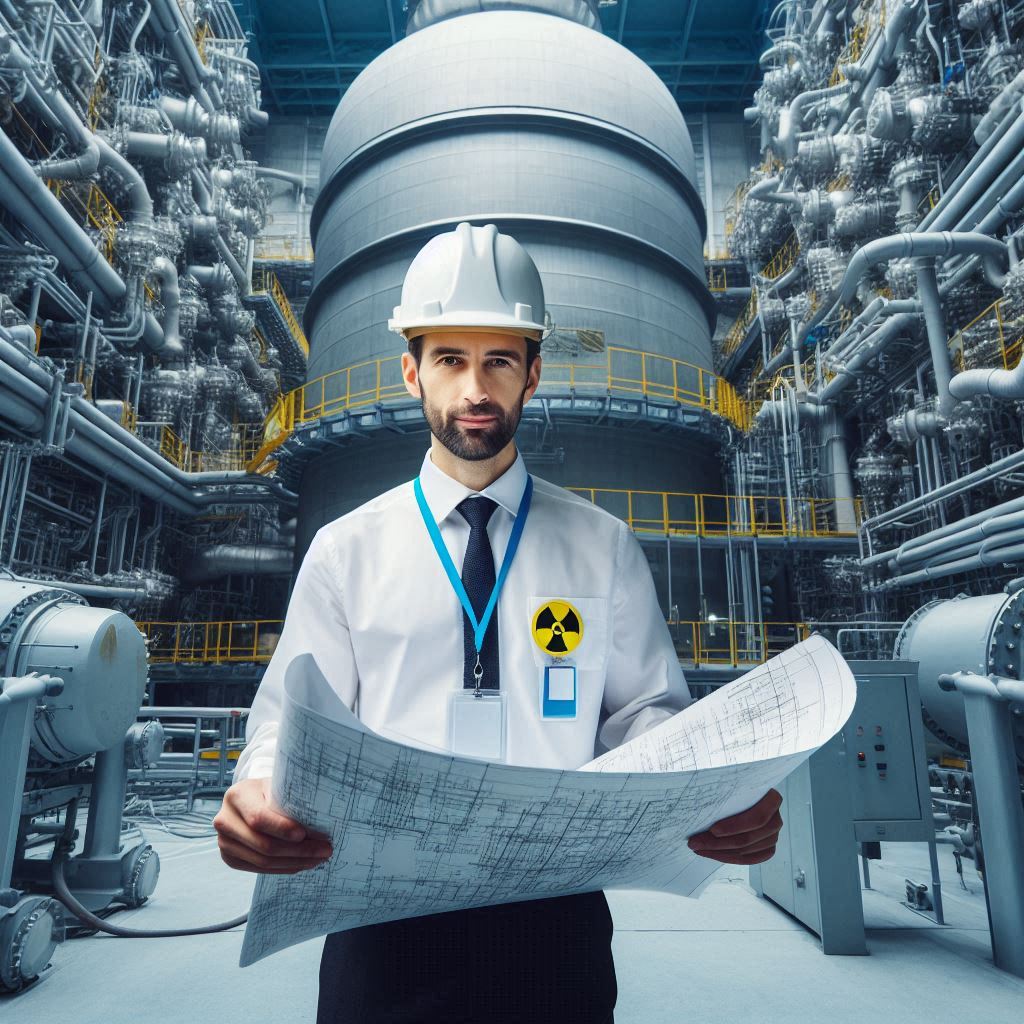Introduction
Licensing is a critical milestone for nuclear engineers, ensuring safety and compliance in a highly regulated field.
This process verifies that engineers possess the necessary knowledge and skills to handle complex nuclear systems safely.
Overview of the Importance of Licensing for Nuclear Engineers
Licensing is essential for maintaining high standards in the nuclear industry.
It ensures that professionals are qualified to manage and operate nuclear systems, thereby protecting public safety and the environment.
A licensed nuclear engineer demonstrates a commitment to rigorous standards and regulatory compliance, which is crucial for career advancement and industry credibility.
The Complex Nature of the Licensing Process
The licensing process for nuclear engineers is intricate and multi-faceted.
It involves meeting specific educational qualifications, accumulating relevant experience, and passing challenging exams.
Additionally, staying up-to-date with evolving regulations and completing detailed documentation adds layers of complexity.
Navigating this process requires careful attention to detail and thorough understanding of both technical and regulatory requirements.
Understanding the requirements for licensure
To work as a licensed nuclear engineer, professionals must meet specific requirements set by regulatory bodies.
These requirements ensure that engineers possess the knowledge and skills needed for safe and effective practice.
Typically, the licensing process involves a combination of educational qualifications, work experience, and successful completion of exams.
Each jurisdiction may have its own specific regulations and procedures, so it is crucial to consult local licensing authorities for detailed requirements.
Educational Background Needed for Nuclear Engineers
A strong educational background is essential for obtaining a nuclear engineering license.
Prospective engineers usually need a bachelor’s degree in nuclear engineering or a closely related field.
This degree should include coursework in nuclear physics, thermodynamics, and reactor design.
Advanced degrees, such as a master’s or Ph.D., can be advantageous and may be required for certain positions.
Educational programs should be accredited by relevant engineering accreditation bodies to ensure they meet industry standards.
Work Experience Required for Obtaining a License
Work experience plays a significant role in the licensing process for nuclear engineers.
Most jurisdictions require candidates to complete a specified amount of practical experience before applying for a license.
This experience typically involves working under the supervision of a licensed engineer in a relevant field.
Candidates often need to document their work experience and demonstrate their ability to handle complex engineering tasks.
Internships or co-op programs during education can provide valuable hands-on experience and help meet these requirements.
Specific Exams and Certifications Needed for Licensure
Obtaining a nuclear engineering license generally requires passing specific exams and certifications.
One of the key exams is the Fundamentals of Engineering (FE) exam, which tests foundational engineering knowledge.
After passing the FE exam, candidates must pass the Professional Engineering (PE) exam in nuclear engineering.
This exam assesses more advanced and specialized knowledge required for the practice.
Additionally, some regions may require specific certifications related to safety and regulatory compliance.
It is essential to prepare thoroughly for these exams, as they are crucial for demonstrating competency in the field.
In summary, navigating the licensing process for nuclear engineers involves understanding and meeting various requirements.
A solid educational foundation, relevant work experience, and successful completion of exams are essential steps.
By fulfilling these criteria, aspiring nuclear engineers can obtain the necessary licensure to advance their careers and contribute to the field effectively.
Read: The Role of Aerospace Engineers in Satellite Development
Researching licensing options
Researching licensing options is the first step for nuclear engineers planning to practice professionally.
Different regions have distinct licensing requirements and procedures.
Understanding these variations helps engineers choose the appropriate path for obtaining their license.
Researching involves exploring regulatory bodies, examining state-specific requirements, and identifying any additional certifications that may be needed.
It is essential to gather detailed information from authoritative sources to ensure compliance with all local regulations and standards.
Overview of Different Licensing Options Available for Nuclear Engineers
Nuclear engineers may encounter various licensing options depending on their career goals and geographical location.
In the United States, licensing typically involves obtaining a Professional Engineer (PE) license, which is essential for advancing in the field.
Additionally, some engineers may pursue specialized certifications, such as those offered by the American Society of Mechanical Engineers (ASME) or other professional organizations.
These certifications can enhance their expertise and career prospects.
Internationally, licensing requirements may differ, with some countries having their own certification processes for nuclear engineers.
Comparison of Licensing Requirements in Different States
Licensing requirements for nuclear engineers can vary significantly from state to state.
For example, California and Texas have distinct regulations and exam requirements compared to states like New York or Florida.
Some states may require additional exams or specific types of work experience.
In contrast, others might have more streamlined processes.
It is crucial to review the licensing requirements of the state where you intend to practice.
Each state’s engineering board or licensing authority provides detailed information on their website about the specific criteria, exams, and documentation required.
Resources Available for Researching Licensing Options
Several resources can assist in researching licensing options for nuclear engineers.
The National Council of Examiners for Engineering and Surveying (NCEES) provides information on the FE and PE exams, including study materials and registration details.
Professional organizations, such as the American Nuclear Society (ANS), offer guidance on licensing and certification for nuclear engineers.
State engineering boards or licensing authorities have websites that outline the specific requirements and application procedures for their region.
Additionally, universities and professional development programs can offer insights and resources for navigating the licensing process.
In summary, navigating the licensing process for nuclear engineers involves researching various licensing options, understanding state-specific requirements, and utilizing available resources.
By thoroughly investigating these aspects, engineers can effectively meet licensing requirements and advance their careers in the field.
Read: Aerospace Engineering in Commercial Spaceflight
Applying for a License
Step-by-Step Guide on the Application Process
Applying for a nuclear engineering license involves several critical steps to ensure compliance with regulatory requirements.
Here’s a step-by-step guide to the application process:
- Review Requirements: Start by thoroughly reviewing the licensing requirements for your state or country. Understand the necessary qualifications, exams, and experience required.
- Gather Documentation: Collect all required documentation, including educational transcripts, proof of work experience, and any additional certifications.
- Pass Required Exams: Successfully complete the required exams, such as the Fundamentals of Engineering (FE) and Professional Engineering (PE) exams, if applicable.
- Prepare Application: Complete the license application form provided by the state or national licensing board. Ensure all sections are accurately filled out.
- Submit Application: Submit your completed application along with the required documentation and application fee to the appropriate licensing authority.
- Application Review: Wait for the licensing board to review your application and documentation. This may involve additional requests for information or clarification.
- Attend Interviews or Additional Requirements: Some states may require an interview or additional steps before granting the license.
- Receive License: Upon approval, you will receive your license, allowing you to practice as a licensed nuclear engineer.
Documentation Needed for the Application
The application for a nuclear engineering license typically requires several key documents:
- Educational Transcripts: Official transcripts from accredited institutions where you completed your degree in nuclear engineering or a related field.
- Proof of Work Experience: Documentation verifying your work experience under the supervision of a licensed engineer, including detailed descriptions of your duties and projects.
- Exam Scores: Proof of passing required exams, such as the FE and PE exams, if applicable.
- Certification Copies: Copies of any additional certifications or professional memberships that may support your application.
- Application Fee: Payment for the application fee, as specified by the licensing authority.
Common Pitfalls to Avoid During the Application Process
- Incomplete Documentation: Ensure all required documents are submitted in full. Incomplete applications can lead to delays or rejections.
- Errors on Application Form: Double-check all entries on the application form for accuracy. Mistakes can cause processing delays or issues with your application.
- Missing Deadlines: Be aware of and adhere to all deadlines for submitting your application and supporting materials.
- Insufficient Work Experience Documentation: Provide detailed and accurate records of your work experience. Lack of clarity or insufficient documentation can hinder your application.
- Not Following Specific State Requirements: Different states may have unique requirements. Make sure you follow the specific guidelines for the state where you are applying.
In summary, applying for a nuclear engineering license involves a detailed process, including gathering documentation, passing exams, and avoiding common pitfalls.
By carefully following the steps and preparing thoroughly, you can successfully navigate the application process and obtain your license.
Read: Essential Aerospace Engineering Textbooks

Preparing for exams
Overview of the Exams Required for Licensure
For nuclear engineers, passing the required exams is a critical step in obtaining licensure. The primary exams include:
- Fundamentals of Engineering (FE) Exam: This is the initial exam for engineers, assessing fundamental engineering principles. It covers a broad range of topics including mathematics, engineering sciences, and ethics. It is often taken shortly after or during the final year of an undergraduate program.
- Professional Engineering (PE) Exam: This advanced exam tests specialized knowledge in nuclear engineering. It focuses on topics such as reactor design, nuclear physics, and safety protocols. The PE exam is typically taken after gaining relevant work experience.
Study Tips and Resources for Exam Preparation
- Understand the Exam Format: Familiarize yourself with the format and content of both the FE and PE exams. Review sample questions and practice exams to get a feel for the types of questions asked.
- Use Study Guides: Invest in study guides and textbooks specific to the FE and PE exams. Books like “Fundamentals of Engineering Exam Review” and “Nuclear Engineering Handbook” provide targeted content and practice problems.
- Join Study Groups: Collaborate with peers who are also preparing for the exams. Study groups can offer support, share resources, and provide different perspectives on challenging topics.
- Take Practice Exams: Regularly practice with sample exams to improve your problem-solving speed and accuracy. This helps in building confidence and identifying areas that need more focus.
- Attend Review Courses: Enroll in review courses or workshops offered by professional organizations or educational institutions. These courses often provide structured study plans and expert guidance.
- Create a Study Plan: Develop a study schedule that allows for consistent and thorough preparation. Allocate time for reviewing each subject area and stick to your plan.
Importance of Passing Exams for Obtaining a License
Passing the FE and PE exams is crucial for obtaining a nuclear engineering license.
These exams assess your competency and readiness to handle the responsibilities of a professional engineer.
Successfully passing the exams demonstrates your mastery of essential knowledge and your ability to apply it in practical scenarios.
It also validates your qualifications to prospective employers and regulatory bodies.
The exams are designed to ensure that only those with the necessary expertise and problem-solving skills can practice as licensed nuclear engineers.
They help maintain high standards within the profession and ensure that licensed engineers can make informed and safe decisions in their work.
In summary, preparing for and passing the required exams is a key component of the licensing process for nuclear engineers.
By understanding the exam requirements, utilizing effective study resources, and following a structured preparation plan, you can successfully navigate this critical step and achieve licensure.
Read: How Agricultural Engineers Improve Crop Yields
Transform Your Career Today
Unlock a personalized career strategy that drives real results. Get tailored advice and a roadmap designed just for you.
Start NowContinuing education and renewal requirements
Explanation of Ongoing Education Requirements for Licensed Nuclear Engineers
Licensed nuclear engineers are required to participate in continuing education to maintain their licensure.
Ongoing education ensures that engineers stay current with advancements in technology, regulatory changes, and industry best practices.
Typically, this involves completing a specified number of continuing education units (CEUs) or professional development hours (PDHs) over a defined period, often every two to three years.
These requirements are set by state licensing boards or professional organizations and may include attending workshops, seminars, or specialized courses relevant to nuclear engineering.
Importance of Staying Up-to-Date with Industry Developments
Staying up-to-date with industry developments is crucial for licensed nuclear engineers.
The field of nuclear engineering is dynamic, with continuous advancements in technology, safety protocols, and regulatory standards.
Keeping abreast of these changes helps engineers maintain their expertise, improve their practice, and ensure the safety and efficiency of nuclear systems.
Additionally, knowledge of the latest industry trends and technologies can enhance career opportunities and professional growth.
Engaging in ongoing education also demonstrates a commitment to maintaining high professional standards and adapting to evolving challenges.
Process for Renewing a Nuclear Engineering License
Renewing a nuclear engineering license involves several steps to ensure compliance with continuing education and other requirements.
Here is a general overview of the process:
- Complete Continuing Education: Accumulate the required CEUs or PDHs as specified by the licensing authority. This often includes documenting your participation in relevant educational activities.
- Submit Renewal Application: Fill out and submit the license renewal application form provided by your state or national licensing board. This form typically requires information on your completed continuing education and professional activities.
- Pay Renewal Fee: Pay the renewal fee, as determined by the licensing authority. This fee covers the administrative costs associated with processing your renewal application.
- Provide Documentation: Include documentation of your continuing education and any other required materials with your renewal application. Ensure all documentation is accurate and complete to avoid delays.
- Review and Approval: The licensing board will review your application and supporting documents. They may request additional information or clarification if needed.
- Receive Renewal: Once approved, you will receive confirmation of your renewed license. This typically extends your licensure for another period, often two to three years.
In summary, continuing education and license renewal are essential for maintaining a nuclear engineering license.
By meeting ongoing education requirements, staying informed about industry developments, and following the renewal process, licensed nuclear engineers can ensure they remain competent and effective in their profession.
Navigating the licensure process for experienced nuclear engineers
Special Considerations for Experienced Professionals Seeking Licensure
For experienced nuclear engineers seeking licensure, the process may involve additional considerations compared to those just starting their careers.
Experienced professionals often need to demonstrate not only their practical experience but also their continued commitment to professional development.
Key considerations include:
- Verification of Experience: Experienced engineers must provide detailed documentation of their work experience. This includes descriptions of projects, roles, and responsibilities that highlight their expertise and leadership in the field.
- Educational Equivalency: If the educational requirements were met many years ago, ensuring that the qualifications still align with current standards may be necessary. Some jurisdictions may require proof that your education is up-to-date.
- Recognition of Prior Learning: Some licensing boards might have processes to recognize prior learning and experience, potentially affecting the type or amount of additional coursework or examinations required.
Options for Expedited Licensure for Professionals with Extensive Experience
Experienced professionals may have options for expedited licensure. These options can include:
- Experience-Based Pathways: Some licensing boards offer pathways that allow experienced engineers to demonstrate their competence through a portfolio of work rather than additional exams. This process typically involves detailed evaluations of their professional achievements and contributions.
- Recognition of Certifications: Engineers with recognized industry certifications or qualifications might find that these credentials expedite the licensing process. Certification from professional organizations, such as the American Nuclear Society, can sometimes substitute for certain educational or experience requirements.
- Fast-Track Programs: Some states or countries offer fast-track licensure programs for professionals with extensive experience. These programs often have streamlined requirements for seasoned engineers, recognizing their substantial practical knowledge and expertise.
Challenges Faced by Experienced Engineers During the Licensure Process
Experienced engineers may encounter specific challenges during the licensure process:
- Documentation Requirements: Gathering and presenting comprehensive documentation of extensive work experience can be time-consuming. Ensuring that all required information is accurately compiled and formatted is essential but often challenging.
- Keeping Up with Changes: Licensing requirements and industry standards may have evolved since the engineer’s initial qualifications. Experienced professionals must update their knowledge and potentially complete additional coursework or exams to meet current standards.
- Navigating Different Jurisdictions: Requirements for licensure can vary significantly between states or countries.
Conclusion
Recap of the Key Points Discussed in the Blog Post
Navigating the licensing process for nuclear engineers involves several crucial steps.
First, you must meet the educational and experience requirements set by regulatory bodies.
Next, passing the necessary exams is essential to demonstrate your expertise.
Staying current with industry regulations and accurately completing required documentation is also vital.
We covered these key aspects to help streamline your path to licensure.
Encouragement for Nuclear Engineers to Navigate the Licensing Process Diligently
Approach the licensing process with diligence and focus.
Each step, from education to documentation, plays a critical role in your professional journey.
By committing to this process and staying meticulous, you ensure not only compliance but also open doors to career growth and opportunities in the nuclear engineering field.
Resources for Further Assistance with the Licensure Process
For additional guidance, the NRC website is a valuable resource, offering detailed information on licensing requirements.
Professional organizations, such as the American Nuclear Society, provide support and networking opportunities.
Additionally, seeking advice from mentors who have navigated the process can provide practical insights.
Utilize these resources to stay informed and successfully achieve your licensure goals.
[E-Books for Sale]
The Big Book of 500 High-Paying Jobs in America: Unlock Your Earning Potential
$19.99 • 500 High-Paying Jobs • 330 pages
Explore 500 high-paying jobs in America and learn how to boost your career, earn more, and achieve success!
See All 500 High-Paying Jobs of this E-Book
1001 Professions Without a Degree: High-Paying American Jobs You Can Start Now
$19.99 • 1001 Professions Without a Degree • 174 pages
Discover 1001 high-paying jobs without a degree! Unlock career tips, skills, and success strategies for just $19.99!




